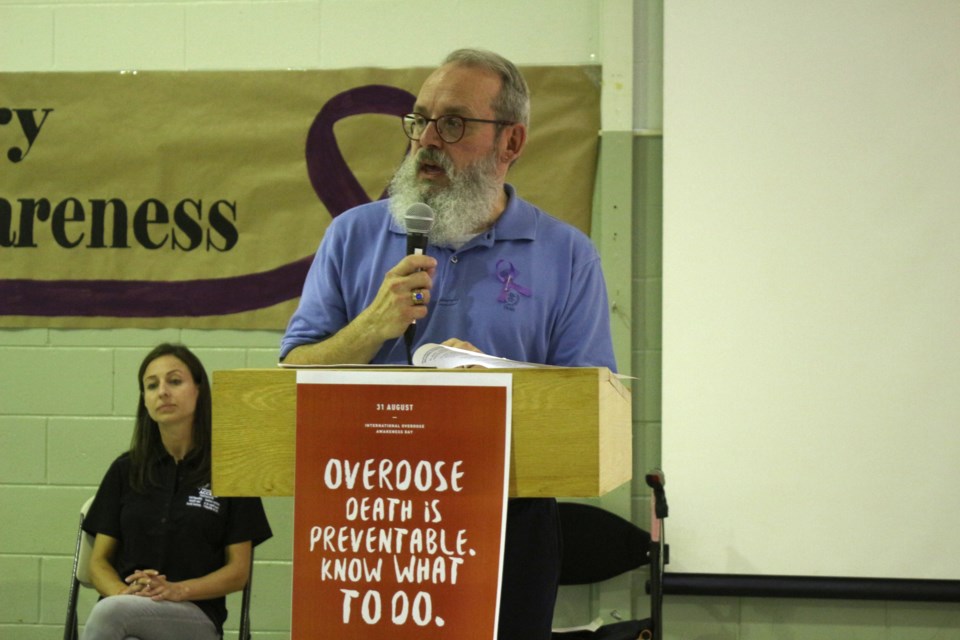Réseau ACCESS Network hosted a kick-off event for Sudbury's first ever Overdose Awareness Week on Aug. 27.
Representatives from a number of community organizations were in attendance Monday to learn more about what is a very real and growing issue in the city of Greater Sudbury.
Mayor Brian Bigger proclaimed Aug. 27 - Sept. 2 as Overdose Awareness Week in the city, while sharing what he and city council are doing to attempt to manage the battle against addiction and overdose.
"I was very proud of our city council announced the transfer of the former Greater Sudbury Police building to the Canadian Mental Health Association to give them a solid roof over their heads to run the off the street program and the harm reduction program," said Bigger.
"I belive it's going to provide four residential housing units, that's phase one. Phase two is another 38 units where people will be able to live as they're transitioning from the lowest point in their life hopefully to get them with a roof over their heads. I'm very proud what we as a council have been able to accomplish but we're just starting, there's so much more work to do."
That work must be community driven and with a common goal and understanding among all agencies and individuals involved, says Réseau ACCESS Network executive director Richard Rainville.
"It's really about awareness, so we're hoping that people with no knowledge or experience can really open their eyes and their ears," said Rainville. "For people who have these lived experiences we want to give them the opportunity to share. For the decision makers in the community they really need to reinforce that this needs to move forward."
Recently, Réseau has expanded their street outreach program from five days a week to seven days and are looking to provide more opportunity for people who have battled or are currently battling an addiction to share their stories with others in the same situation.
"We're expanding our peer programs to train individuals with lived experiences so they can help our staff to do more outreach," said Rainville. "We know people who are still actively involved in their drug use that want to speak to and hear from people who have the same experiences as them. We're hoping to match those individuals with our staff and create the opportunity for more people to be able to get out and connect with people."
Last year, more people died due to opioid overdose in Canada, more than were killed by car accidents.
"The general public has not caught on to that idea," said Bigger. "What do we do for car accidents? A lot of things. What is being done for opioids? We're just starting. To me that is a really shocking statistic."
When it comes to helping those struggling with addiction, the solution is not yet clear, but initiatives like Overdose Awareness Week are a key jumping off point when it comes to peeling back the stigma of addiction and opening the door to the conversations that must be had to move forward.
"I think of overdose as a complication of illness, I think the illness could either be addiction or untreated mental health and this is taken into the hands of patients," said Dr. Suman Koka, Northwood Recovery.
"When we think of drug use, we must think of it almost like HIV treatment. Back in the day we treated HIV by basically segregating and quarantining patients and saying 'this is how we're going to treat them'. Unfortunately, studies have shown that this only worsened HIV, less people went for treatment and it increased the spread. I think one of the biggest things we learned from this is we need to reduce the stigma, we must activate patients, we must improve access for patients to get medical treatment."
The overarching message the Réseau ACCESS Network is looking to get out this week is that addiction and overdose are not just big city issues, and that anyone can be affected.
"Overdose doesn't discriminate. Fentanyl has been cross-contaminated into a number of different substances so sometimes people end up consuming a very potent opioid without their knowledge, so even someone who is a recreational drug user could potentially be at risk for overdose," said Amber Fritz, outreach coordinator, Réseau ACCESS Network.
"Awareness is the key of this week, so people realize that this isn't something that's just happening in Toronto and Vancouver and places like that, this is a very real issue in our community."
